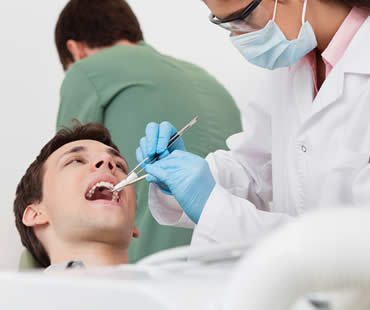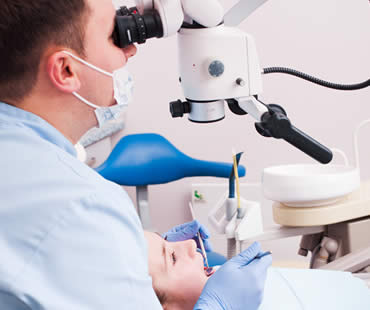
Many oral surgeries go beyond simply removing a tooth, and the cause is not always related to poor dental hygiene. Some reasons for oral surgery just can’t be predicted or avoided, such as injuries, birth defects, or cancer. Great strides have been made in oral surgery, especially for restoration and reconstruction techniques. These are some common reasons that oral surgery is advised.
Tooth loss
Replacing missing teeth with dental implants requires oral surgery so that the titanium implant can be inserted into the jaw. Providing an alternative to dentures and bridges, implants offer a secure and permanent solution that looks very natural. Candidates with adequate bone density, good overall health, and who practice proper oral hygiene are considered for implant surgery. After the implant heals, a crown will be placed on top to complete the restoration.
Impacted teeth
One of the most common oral surgeries is to remove impacted wisdom teeth. Often occurring during the late teen to early adult years, wisdom teeth are unable to erupt properly and must be extracted to prevent future problems.
TMJ
Temporomandibular joint disorders involve the joint where the skull and lower jaw come together in front of the ear. Facial pain, headaches, popping, and jaw problems can result, and dentists try to treat the disorder with solutions like splints, physical therapy, and medications. Severe cases can require surgery to fully correct the TMJ problems.
Injuries
Car accidents, sports injuries, and other trauma can cause broken facial bones or jaws. Surgery may be necessary to realign the jaws, wire bones together, and otherwise repair the injury so that normal function and comfort can be restored.
Cleft repairs
Birth defects like a cleft lip or palate are corrected through oral surgery. Usually a series of surgeries over a span of years is needed to improve the appearance and proper function of the areas affected by the birth defect.
Biopsy
Surgery is performed to remove cancerous tumors or lesions in the jaws or facial bones. This is especially true when the joints or connecting muscles and tendons are involved.

There are a number of reasons that dentists or oral surgeons recommend surgery, but facial injuries are probably the most unexpected and alarming cause. Maxillofacial injury, or facial trauma, refers to any injury to the mouth, jaw, and face. Most of these injuries result from sports, car accidents, job accidents, violence, or an accident at home. Let’s learn about oral surgery resulting from facial trauma.
Broken bones are a common type of serious facial injury. Fractures can occur in the upper or lower jaw, cheekbones, palate, and eye sockets. Injuries in these locations may affect vision and the ability to eat, talk, and breathe. Hospitalization is often required for treatment, which is similar to that for fractures in other parts of the body. The bones must be lined up and held in place to allow time to heal them in the correct position. Because casts are not possible in facial injuries, the surgeon may use wires, screws, or plates to treat fractures. Sometimes healing takes as long as six weeks or more.
Even though some facial injuries are worse than others, all of them should be taken seriously. They affect an important area of the body, so it is recommended to seek treatment from an oral surgeon to make sure you receive optimum care. Even if stitches are all that’s required, it’s best to have them performed by an oral surgeon who can place them exactly as needed to produce the best results.
It’s no surprise that the best solution for facial injuries is to prevent them in the first place. Oral surgeons suggest consistent use of mouth guards, seat belts, and masks and helmets as required. Improvements have been made to safety gear to make these items more comfortable and efficient, so there should be no excuses for not using them to protect yourself and avoid injuries that can lead to oral surgery.
If you need a dentist in Sicklerville contact us today

Your family, general, or pediatric dentist or orthodontist may refer you to an oral and maxillofacial surgeon for some dental treatments that require oral surgery. An oral surgeon is a specialist who has graduated from an accredited dental school and also completed additional education and residency related to surgical procedures needed to treat various oral diseases and conditions. An oral surgeon is trained in treating the following conditions:
- Removal of diseased or impacted teeth
- Placement of dental implants
- Treatment of facial trauma involving gums, jaws, nasal cavities, cheekbones, eye sockets, and forehead
- Evaluation of pathologic conditions such as cysts and tumors of the mouth and face or acute infections of the oral cavity, salivary glands, neck, and jaws
- Treatment of facial pain including those caused by temporomandibular (TMJ) problems
- Cosmetic or reconstructive surgery to correct jaw, facial bone, and facial soft tissue problems
- Corrective jaw surgery
- Cleft lip and cleft palate repair
- Surgical treatment for sleep apnea
There are many different techniques that oral surgeons use to accomplish your treatment goals. The choice of techniques may vary between surgeons and should be discussed between you and your surgeon prior to the procedure.
Many oral surgery procedures can be completed in an outpatient setting. Often you are only in the office for a few hours and can return to your regular routine in a matter of days. A good oral surgeon will be able to perform these procedures with little chance of complications, and will be able to provide you with the information you need to understand the recovery process. Your oral surgeon will often collaborate with other specialists, such as an orthodontist or cosmetic dentist, to achieve your ultimate treatment goals.
We look forward to seeing you in our Sicklerville dental office









